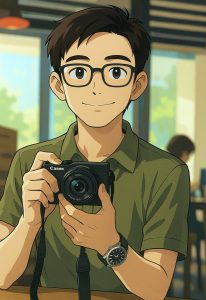A Face That Felt Familiar Yet Foreign
It happened by chance, on a bustling street in Tokyo. A telecom company was running a promotional event—buy a phone card and get a caricature printed on it instantly. I got in line, half out of curiosity, half out of amusement. Minutes later, they handed me a sketch of a person who looked oddly familiar—yet wasn’t quite me.
It was charming and warm in a way no regular profile photo could replicate. That image has been my go-to social media avatar ever since. It doesn’t show my actual face, but rather, a version of myself filtered through whimsy. These days, that’s a familiar story.
Becoming Someone Else Through Ghibli
Look around on social media, and you’ll see it everywhere—profile pictures styled in the hand-drawn, dreamy aesthetic of Studio Ghibli. With just a few taps on AI tools like ChatGPT or image generator apps, anyone can become the protagonist of a Ghibli film. The soft hues, ageless beauty, and slightly surreal charm seem to offer an emotional escape from the real world.
But there’s something eerie about it, too. The more we embrace these avatars, the more we lose the real faces behind them. They start to look like anonymous characters from an animated universe, not actual people. Perhaps the appeal lies in the contradiction: revealing ourselves more deeply by choosing to hide.
The Uneasy Beauty of AI Perfection
Watching this trend unfold, I find myself torn. As someone who has spent over 40 years behind the camera, I am both impressed by the technical sophistication of these AI-generated images—and unsettled by it. The delicate, handcrafted Ghibli worlds that once took years of artistic labor can now be replicated in mere seconds.
And that makes me wonder: are we okay with this?
What Miyazaki Warned Us About
In a 2016 NHK documentary, Ghibli co-founder Hayao Miyazaki was shown an AI-generated animation that mimicked distorted walking. When asked for his thoughts, he didn’t hesitate: “The creator of this doesn’t understand the pain of physical disabilities,” he said. “It feels like an insult to life.”
At the time, it may have sounded dramatic. But today, his warning feels prescient. Back then, AI merely mimicked. Now, it encroaches on originality, touching the very essence of artistic identity.
A Legal Gray Area with Real Consequences
What troubles me even more is the unclear legal status of the data used to train these AI models. Ghibli-style art is being replicated using datasets with no clear copyright boundaries. As more people use these images without a second thought, the rights of the original creators are pushed to the margins.
Some experts warn that when AI-generated content closely resembles existing works, it may be considered copyright infringement. And yet, there are no clear guidelines. While some argue that an “art style” isn’t protected by law, what happens when that style is the product of a creator’s decades-long devotion?
If AI continues to absorb and repackage human artistry without limitation, we may one day face a reality where the very concept of creative ownership becomes meaningless.
What’s at Stake Isn’t Just Art
That’s why now—before it’s too late—we must ask:
Does technological progress justify erasing the rights of creators?
Can fast and flawless really replace slow and soulful?
In this rapidly evolving AI era, we need legal and ethical frameworks that protect not just the product of creativity, but the spirit behind it. This isn’t about banning AI-generated art. It’s about respecting the original sweat, heart, and vision that made such beauty possible in the first place.
Escaping Into Our Ideal Selves
Perhaps this Ghibli profile picture trend speaks to a deeper yearning—to be someone softer, simpler, safer. In a digital world that moves too fast, it’s tempting to adopt a version of ourselves that lives in a frame of fantasy.
But even those fantasy worlds were built by human hands. Behind every shimmering landscape and gentle gaze was an artist who spent sleepless nights crafting what now takes mere seconds to replicate.
If we truly love what these images represent, then we owe it to their creators to protect, honor, and uphold their rights.
Not someday. Now.
By Naki Park
The author is a business editor of the Korea Daily.





